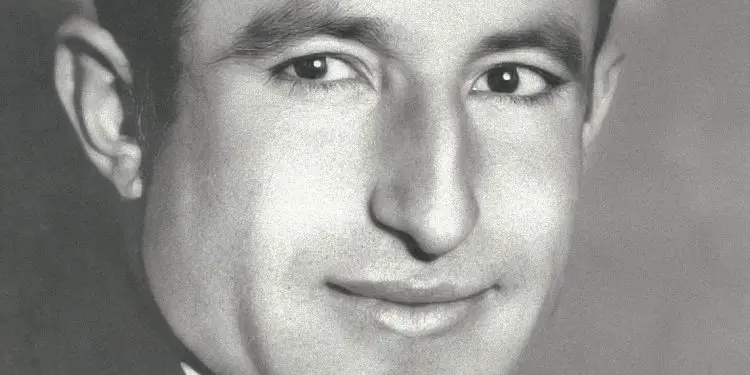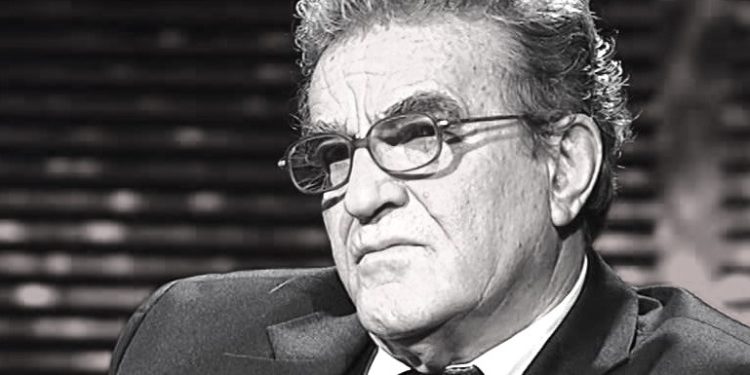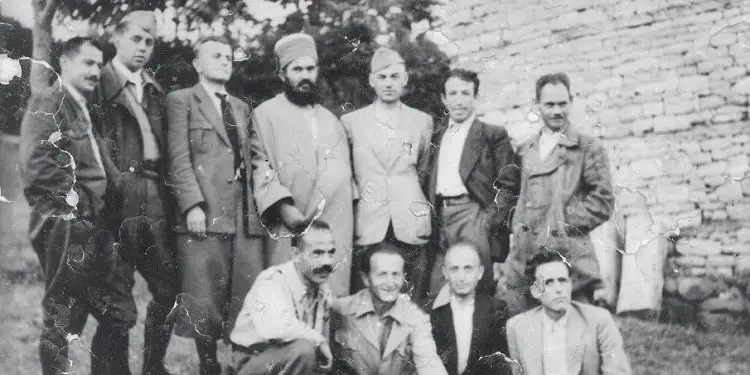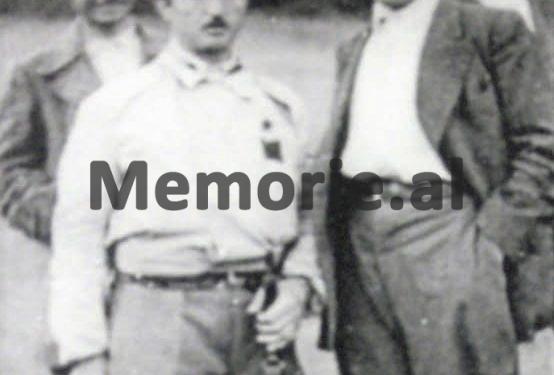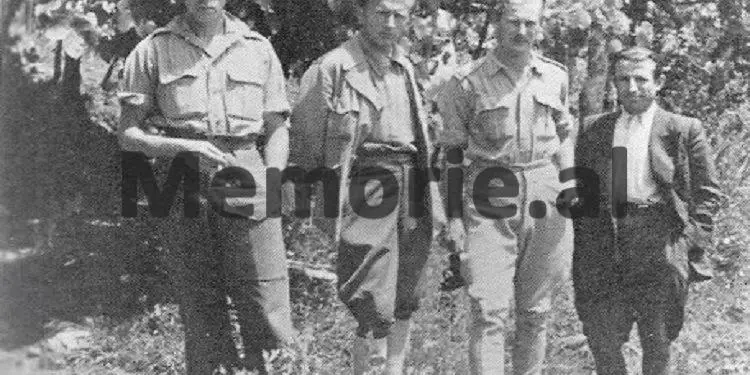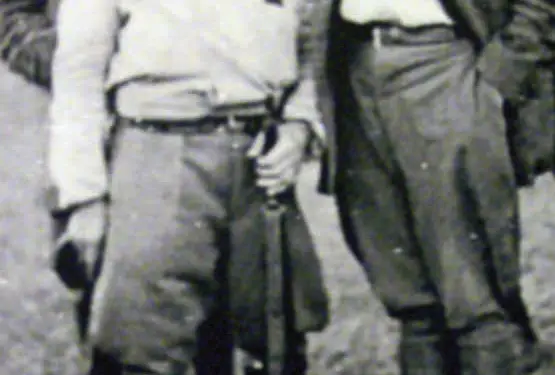From Uran Butka
The first part
Memorie.al / Mustafa Gjinishi were an outstanding and special personality of the Albanian progressive left, in the struggle for liberation and national unity. He became such, as a result of the patriotic and democratic tradition of the Peqin region and the Gjinishi family, a product of his time, qualities and unusual will. The Gjinishi family influenced the formation of young Mustafa. His father, Ademi, took an active part in raising the national flag on November 26, 1912 in Peqin. He was a Peqin delegate, in the Lushnja Congress, in 1920 and a supporter of the democratic wing. He was killed by the people of Shefqet Vërlac, in 1923.
Mustafa’s knowledge was particularly influenced by his uncle, Mahmud Kaziu, sub-prefect of Peqin and signer of Independence in 1912, as well as his older brother, Rexhepi, who attended classes at the French Lyceum of Korça. Mustafa himself attended secondary education at the American Technical School in Tirana, in the years 1924-1930, in the field of education, but he excelled in all areas. Director Harri Fultz appreciated him a lot, not only for his excellent results, but also for his character, maturity, knowledge (since school he mastered several languages, such as: English, German, French, Italian, etc.) and Western ideas.
He called Mustafa; “student, with concepts like in the West”. The student Gjinishi became the mind and soul of the magazine “Laboremus”, where he also published his English translation of Gjergj Fishta’s “Lahuta e Malcis” and the reviews for it. “Just as England is proud of Byron, Milton and Shakespeare, Germany of Goethe and Schiller, Italy of Dante and Virgil, Spain of Cervantes…, so is Albania proud of Gjergj Fishta”! (Laboremus magazine, July 1929).
Also, as the head of the school’s Literature Club, Mustafa also initiated the publication of the literary and scientific magazine “XX Century”, where he writes well-known works such as; Mid’hat Frashëri, Skënder Luarasi, Tajar Zavalani, etc. After finishing the technical school, he opened a bookstore with progressive literature in Tirana, as well as in Kavajë, as well as published articles in the opposition newspapers and magazines “Bota e Re”, “ABC”, “Jeta dhe kultura”, ” Rebirth” “Flaka”, “Besa”, etc.
Gjinishi came into contact with the communist ideas, in fashion at that time and with their bearers: Hasan Reçin, Demir Godelli, Riza Cerova, Petro Marko, etc., and also collaborated with them as an oppositionist. He was sentenced to prison twice, for political reasons, then, when he was in prison, he was sentenced to death, for participating in the Fier Uprising in 1935, a sentence that was returned to him with life imprisonment. Mustafai answered: “I have ten months in prison, where it is not possible to enter into an agreement with anyone outside. I demand innocence”! (AQSH, Fondi 257, D.17/fl.3) Even in prison, he finds the opportunity to study. “I spend my time reading and learning,” he wrote to his sister Xhemile. It was released in 1938.
Mustafa did not accept the fascist occupation of Albania, participated in the first demonstrations of April 1939 and then escaped to Yugoslavia, together with Myslim Peza, Haxhi Lleshi, Mustafa Kaçaçi, Hamit Shijak, etc. There they came into contact with the Directorate of Allied Operations (SOE) and the British military attaché, Julian Emery, who organized a group of more than 300 anti-fascists, and led by Baritanic, Oklli Hill, entered Albania in April 1941, to instigated the anti-fascist uprising. It should be noted that this project was a coalition of forces, consisting of the right wing (Abaz Kupi), the center (Gani Kryeziu) and the left wing (Mustafa Gjinishi). (See: Julian Emeri, “Sons of Shqipe”, London 1949).
It was at this time that the political action of Mustafa Gjinishi began, for the realization of the general uprising in Albania, in cooperation with all the anti-fascist forces and coordinated with the Western allies. The placement of Mustafa Gjinishi in Peza was important, as it had become the main focus of the Anti-Fascist War. It is no coincidence that in March 1941, the Italians organized a punitive military operation in the Peza area. Myslim Peza’s nationalist squad operated in Central Albania, where the nationalist squads of Ismail Petrela and Shyqyri Peza, Myslim’s brother, also operated.
Mustafa became the commissar of the Peza detachment and this was included in the National Liberation Movement. Commander Myslim Peza loved Mustafana as his own son, and even Xhemilja became a partisan of this gang, as well as many other Peqinas. One of the actions of the gang was the release of political prisoners from prisons and internment camps. Mustafa’s release from the internment camp of the Montenegrin communist, Miladin Popovic, who later “rewarded” him by eating his head, should also is seen in this perspective. Other actions against the Italians, he made detachments in Peqin, Kavaje, Peze, Shijak, etc.
Mustafa fought bravely against both the Italian and German invaders, even in the battle of Arbana, against the Germans, he was wounded in the arm. The great political action of Mustafa Gjinishi and Koço Tashko is the organization of the Peza Conference on September 16, 1942. Mustafa’s ideas were for a common anti-fascist front and cooperation with the nationalists in the struggle for liberation.
Enver Hoxha was still a second-hand figure (“I received a letter from Miladini, where he told me to inform so-and-so that we were going to hold a conference. When I went to Peza, the reports had been prepared…! I went out to read that report, but to defend the thesis, no” – recounts Enver Hoxha), while Miladini himself stood outside the house where the conference took place, while Mustafa Kaçaçi, Ramadan Çitaku and Haxhi Lleshi intervened so that Miladini could enter as a listener. (AQSH, pg. 14 D.5, Year 1942).
It is to the credit of Gjinishi, that in this conference of the Albanian Communist Party, individuals and nationalists, guests and friends of Mustafa, participated as individuals, such as; Abaz Kupi, Ismail Petrela, Azis Çami, Baba Faja Martaneshi, Ndoc Çoba, Ramazan Jarani, Skënder Muço, Halim Begeja, Xhemal Herri, etc., giving the conference colors of political pluralism. She elected the Presidency of the General National-Liberation Council, with chairman Kamber Qafëmolla and secretary Mustafa Gjinishi, consisting of 8 people: three communists: Ymer Dishnica, Enver Hoxha and Mustafa Gjinishi and five nationalists: Myslym Peza, Baba Faja, Abaz Kupi , Ndoc Çoba and Kamber Qafëmolla.
The Peza Conference, which laid the foundation for the National Liberation Front, was a premise of cooperation based on the pluralistic platform of “uniting all forces of the Albanian people, regardless of religion, region or political belief”. Also, the decision-making at this conference for an immediate war against the occupier, leaving after the war the choice of the form of the regime and the taking of power, created opportunities for understanding and cooperation with other political and military factors in the struggle for liberation. However, Enver Hoxha’s clique, also encouraged by the Yugoslavs and the struggle for power, betrayed the platform of the Peza Conference, put the National Liberation Front under the leadership and control of the NPSH, expelled the nationalists, even five of the eight members of the General National-Liberation Council, declared them traitors and physically eliminated them, including Mustafa Gjinish.
By 1943, political and military relations had changed considerably. Fascist Italy was capitulating, while another invader was appearing on the Albanian horizon, the German one, even with a brutal massacre in Borovo, in July 1943. The country was dominated by two antagonistic political and military organizations: ‘Balli Kombëtar’ and ‘Fronti Nacional’ -Liberator’, with all their supporters. It was an imperative of the time, the cooperation between them. Even this cooperation in the war started from below. Almost in all regions, local agreements and joint fights against the invaders were made, according to the Albanian tradition (Korçë, Gjiirokastër, Tepelën, Librazh-Polis, Vlorë, Mat, Lure, etc.).
Mustafa understood this need of the time and continued the effort to unite all Albanian factors in the struggle for liberation. He collaborated with nationalists within the Front, such as; Ymer Dishnica, Abaz Kupin, Shefqet Beja, Sheh Karbunara, etc., and outside the Front, with representatives of the “National Front”, such as; Mid’hat Frashërin, Ramazan Jaran, Hasan Dostin, and others, becoming the main unifying element.
“Our people reported to us,” wrote Enver Hoxha, “that Mustafa was meeting with Lumo Skëndo, Sheh Karbunara, Abaz Kup and others.” He held meetings with a bunch of people: Beylers, some of them declassified some sympathizers with the Movement, some born and determined anti-communists. Mustafa had a great conversation with Ismail Ag Petrela and his house in Tirana, he had a basis…! Mustafai does not know the difference between communists and nationalists. He manages to criticize the proclamations, which according to him do not have enough nationalism inside. Wonder?!
He has such an opinion that; “Our war today is only a war for solidarity and internationalism and not a war for the good of the Albanian people”! (The first consultation of the NPSH, April 8, 1942)
Muatafai was a communist with nationalist fervor, who saw the interests of the country and the people in the first place, he was a democrat, who talked even with political opponents, for the major interests of the nation and was concerned about a democratic Albania, he was a staunch anti-fascist, who led the fight for freedom, but also fought himself, a valuable coordinator of the Western Allies and especially of the British, who helped the Anti-Fascist War, as well as an opponent of terrorist methods and Yugoslav policies towards Albania.
Two directions were outlined within the NPSH and the National Liberation Movement, one moderate, humane and with a national sense, where they line up; Ymer Dishnica, Mustafa Gjinishi, Koço Tashko, Omer Nishani, Anastas Lulo, Sejfulla Maleshova, Gjergj Kokoshi, Myslim Peza, etc., while the other group included Stalinist communists, avowed extremists and with a terrorist sense, such as; Enver Hoxha, Koci Xoxe, Mehmet Shehu, Haxhi Lleshi, Ramadan Çitaku, Hysni Kapo, Shefqet Peçi, Kristo Themelko, Liri Gega, and others, who were obedient tools of the Yugoslav communists, Tito and his emissaries, Miladin Popovic and Dushan Mugosha.
Until the Assembly of Mukje, the democratic wing mainly dominated, which led to cooperation with nationalists and other actors of the Anti-Fascist War and in the Mukje Agreement, August 1943. Of course, the achievement of the Mukje Agreement was also influenced by external factors: the Coalition the great Anti-Fascist, especially the British and American mission in Albania, which sought the unity of all Albanians, in the fight against Nazi-fascism.
Mustafa Gjinishi called the political opponents and other factors outside the Front, as part of the people and the common war and not as enemies. With the proposal of Abaz Kupi and the support of Gjinishi, the General National-Liberation Council called the political and military alliance with the ‘National Front’ necessary and decided in July 1943 to hold a meeting with the representatives of the ‘National Front’, defined the issues that would to talk in Mukje’ as well as the delegation, which they were part of; Ymer Dishnica, Mustafa Gjinishi, Abaz Kupi and Myslim Peza.
Likewise, the Presidency of the “National Front” welcomed the alliance with the National Liberation Party and appointed its representatives, with Mid’hat Frashëri at the head. So it was a common will that produced the Mukje Agreement. This national agreement is one of the most important in Albanian history, because it united two opposites, two opposing political extremes, for major national interests and made very important decisions for that time, but also for the future:
Joint and immediate war against the Great Allies; England, the USA and the Soviet Union, as well as oppressed peoples, against the barbarian invaders.
- Struggle for an Independent Albania, struggle for the implementation of the universally recognized principle guaranteed by the Atlantic Charter of the self-determination of peoples, for an ethnic Albania.
- Fight for a free, democratic and popular Albania.
- The Committee for the Rescue of Albania will continue the fight to lead the Albanian people, on the path of sacrifice and honor until the formation of a provisional government.
The form of the regime will be determined by the people themselves, through a constitutional assembly elected by direct universal suffrage. (Proclamation of Mukje, AQSH, P.14, File. 21, Year 1943). Gjinishi was unanimously elected secretary of the Assembly of Mukje. He played an important role in the realization of the agreement. Ymer Dishnica, the head of the delegation, wrote from Mukja to Enver Hoxha, among other things:
“A meeting was previously held by ‘Tafari’ (Mustafa Gjinishi, my note – U.B.) with Mid’hat Frashëri and Hasan Dosti, in favor of our thesis…! Mustafa’s attitude at the Mukaj meeting was very good; he defended our decisions with great severity and vigor…! Tafa has stood and continues to stand like no other. This is not only my opinion, but also that of ‘Hysen’ (Pseudonym of Gogo Nushi, my note, U.B.), who assisted as a delegate in all the debates. This is also the opinion of other delegates…! (Letter of Ymer Dishnica, AQS, Page 14 D.21, V.1943).
While Enver Hoxha, under the dictates of Yugoslav emissaries, called the Mukje Agreement a betrayal and also betrayed the position of Ymer Dishnicë, Mustafa Gjinishi and condemned them at the Second Labinot Conference (September 4, 1943), where he also declared war on ‘Balli Kombëtar’, legalists and all those who fought outside the Front, against the invaders, calling them enemies and collaborators with the invader, when a few days ago he had signed the cooperation agreement with them in Mukje.
Enver Hoxha also called Mustafa Gjinishi a spy for the British, with whom we were allies during the war. The two-faced policy of Enver Hoxha, who, on the one hand, called the National Liberation Movement as part of the Anti-Fascist Coalition and sought and received political, military, material and gold support from the British missions, on the other hand, accused them of being absurd and monstrous. the British for treason, while Mustafa Gjinish, as their agent! Memorie.al
The next issue follows




